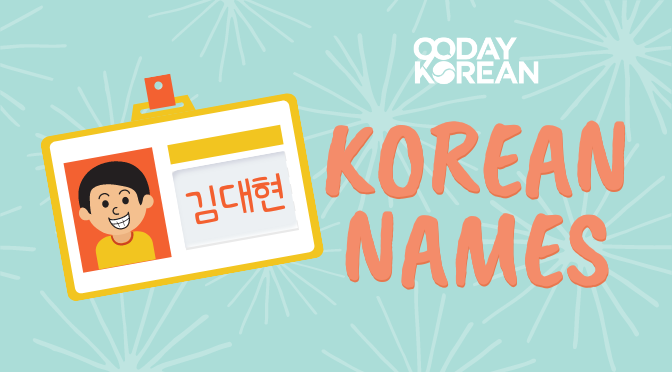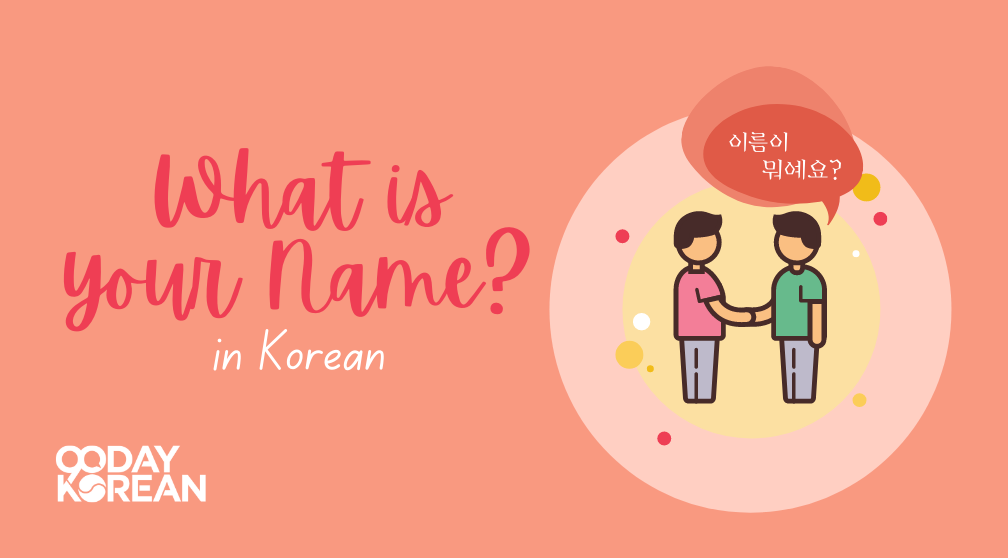In this article, you will learn all about Korean names.
Knowing someone’s name is important to properly address the person. If you don’t know it yet, you can always ask. But it’s more than just that in Korean culture.
Listed below are the different Korean last names and first names. We’ve also added the meaning of some of these names to help you have a better grasp of Korean first and last names. Let’s get started!
List of Korean Names
Below are lists of common South Korean family names and Korean first names.
List of Korean Surnames and Meanings
Here is a list of the popular Korean surnames in both English and Hangul, along with their meaning.
| Korean Family Name | Hangul | Meaning |
|---|---|---|
| Kim | Meaning: Metal, gold or iron | |
| Lee | Meaning: Plum tree |
|
| Park/Bak | Meaning: Gourd | |
| Gwan | Meaning: Tube or pipe | |
| Jeong | Meaning: Tablet or quiet | |
| Yang | Meaning: Amount or positive | |
| An | Meaning: Within | |
| Jin | Meaning: Camp lost or a sign of the dragon | |
| Yoo | Meaning: Willow tree | |
| Han | Meaning: The One | |
| Nam | Meaning: A Man or south | |
| Cho | Meaning: Second or beginning |
|
| Yun | Meaning: Cloud or luck | |
| Pae | Meaning: Loosely or The name of the 'Pae' clan | |
| Ma | Meaning: Horse, hemp |
List of Korean First Names and Meanings
Below are the popular Korean first names in English and Hangul. It also includes the meanings of each native Korean word.
| Name | Hangul | Gender | Meaning |
|---|---|---|---|
| Ara | Female | Meaning: Beautiful | |
| Areum | Female | Meaning: Beautiful | |
| AYeong | Female | Meaning: Refined | |
| BoBae | Female | Meaning: Treasure, precious | |
| Bom | Female | Meaning: Spring | |
| BoRa | Female | Meaning: Purple color | |
| Byeol | Female | Meaning: Star | |
| ChoHee | Female | Meaning: Beautiful, joy | |
| Daehyun | Male | Meaning: Wise man | |
| DaeSeong | Male | Meaning: Great success | |
| DaEun | Female | Meaning: Young girl or Silver | |
| DaJeoung | Female | Meaning: Loving and understanding | |
| DoHyun | Male or Female | Meaning: An intelligent person | |
| Donghyun | Male | Meaning: A symbol of strength. | |
| DoYoon | Male | Meaning: A government post | |
| DoYun | Female | Meaning: Lotus blossom | |
| Eun Ae | Female | Meaning: Grace and love | |
| EunHee | Female | Meaning: Wish | |
| EunHye | Female | Meaning: Grace | |
| EunJeong | Female | Meaning: Warmth | |
| EunJi | Female | Meaning: Wisdom or mercy | |
| Eunsuh | Female | Meaning: Mercy or west | |
| EunYoung | Female | Meaning: Talent | |
| GaHee | Female | Meaning: Beauty or elegance | |
| Hana | Female | Meaning: One | |
| Haru | Female | Meaning: Spring | |
| HaYoon | Male or Female | Meaning: Morality or richness | |
| HeeJin | Female | Meaning: Honest | |
| HyeJin | Female | Meaning: Bright | |
| HyeonJeong | Female | Meaning: Virtuous or worthy | |
| HyeonJu | Female | Meaning: Jewel or pearl | |
| HyeonU | Male | Meaning: Manifest or clear | |
| HyunYoung | Female | Meaning: Able | |
| Iseul | Female | Meaning: Dew | |
| Jaehyun | Male | Meaning: Wisdom | |
| JangMi | Female | Meaning: Rose | |
| Jeong | Male or Female | Meaning: Gentle | |
| JeongHui | Male or Female | Meaning: Right or beauty | |
| Jia | Female | Meaning: Clear or good | |
| JiEun | Female | Meaning: Branch or kindness | |
| JiHo | Male | Meaning: Brave spirit |
|
| JiHoo | Male or Female | Meaning: Wisdom or elegant | |
| JiHye | Female | Meaning: Intelligent | |
| JiMin | Male or Female | Meaning: Gentle or jade | |
| Jin | Male or Female | Meaning: Jewel or truth | |
| JinHwa | Female,Male | Meaning: Most wealthy | |
| JinSol | Female | Meaning: Become a leader | |
| JiSoo | Male or Female | Meaning: Gorgeous | |
| JiU | Male or Female | Meaning: Ambition or universe | |
| JiWon | Male or Female | Meaning: First beautiful woman | |
| JiYoung | Male or Female | Meaning: Honor |
|
| Jiyun | Female | Meaning: Glossy | |
| JooEun | Female | Meaning: Silver pearl | |
| JooMi | Female | Meaning: Pretty | |
| Joon | Male | Meaning: Strict | |
| JooYeon | Female | Meaning: Gentle or relaxed | |
| JunA | Female | Meaning: Swift horse | |
| JunHo | Male | Meaning: Summer sky | |
| Junwoo | Male | Meaning: Handsome | |
| KiPpeum | Female | Meaning: Joyful | |
| KyungHee | Female | Meaning: Hope | |
| MiHee | Female | Meaning: Beautiful or joy | |
| Min | Male or Female | Meaning: Jade | |
| Minho | Male | Meaning: Fall sky | |
| MinJi | Female | Meaning: Sharp or comprehend | |
| MinSeo | Female | Meaning: Composed or People | |
| Nari | Female | Meaning: Lily | |
| SaeRom | Female | Meaning: Bamboo | |
| SangHoon | Male | Meaning: Eternal or teach | |
| Sena | Female | Meaning: Neatly | |
| SeoHyeon | Female | Meaning: Felicitous omen or worthy | |
| SeoJoon | Male | Meaning: Slowly | |
| Seok | Male | Meaning: Tin | |
| Seol | Female | Meaning: Snow | |
| SeoYeon | Female | Meaning: Make clear |
|
| Seunghyun | Male or Female | Meaning: Succession | |
| Shin | Male | Meaning: Center or belief | |
| SiWoo | Male | Meaning: Honest | |
| SoHee | Female | Meaning: Young or honest | |
| Soo A | Female | Meaning: Talent or lofty | |
| Soobin | Male or Female | Meaning: Sparkle | |
| SooHo | Male | Meaning: Guardian | |
| SooJin | Male or Female | Meaning: Truth | |
| Soomin | Male or Female | Meaning: Smart | |
| SooYeon | Female | Meaning: Lotus flower or lovely | |
| SungMin | Male or Female | Meaning: Star or clever | |
| Taeyeon | Female | Meaning: Proud or big | |
| Wook | Male | Meaning: Dawn or rising sun | |
| YeEun | Female | Meaning: Rainbow | |
| YeJi | Female | Meaning: Study or Beautiful | |
| YeJoon | Male | Meaning: Trout or humble | |
| YeonAh | Female | Meaning: Beauty or better | |
| Yeong | Male or Female | Meaning: Flower | |
| YeRim | Female | Meaning: Azure | |
| YooJin | Female | Meaning: Generous | |
| Yoon | Female | Meaning: Shine | |
| YoonAh | Female | Meaning: Highly beauty | |
| YuMi | Female | Meaning: Willow or beauty | |
| YunSeo | Female | Meaning: Allow or lazy | |
| Yuri | Female | Meaning: Comfortable or glass bead |
All About a Korean Name
What’s in a name? Well, in Korea — a name can mean quite a bit, actually!
Many parents in South Korea will spend a lot of time and money to come up with cute names for baby girls and baby boys. It’s not just about choosing Korean baby names that will make their child popular. They believe that names can determine their destiny.
Almost all names in the Korean language have a deeper meaning through Hanja (Chinese character). These names from Chinese origin are called Sino-Korean, but more on that later.
With a child’s future on the line, it’s important to come up with a good name in Korean. The family doesn’t necessarily choose a name because it’s popular, but they will often choose one that means something in Korean.
How do South Korean Names Work?
You may have seen a Korean name before. Maybe you have a favorite K-pop star, K-drama character, Korean movie character, or Korean athlete. Do any of these popular Korean individuals ring a bell?
Kim Yuna (김연아)
Lee Hyo-ri(이효리)
Lee Min-ho (이민호)
Bae Yong-joon (배용준)
As you can see, most names in Korean have three syllables.
There are some names with more than three syllables and some names with less. However, the large majority of names have three.
You should try to stick with a three-syllable name as well when coming up with a name in Korean for yourself. It’ll make it much easier for your Korean friends and acquaintances that way.
김 = Kim (Surname)
민수 = Min-su (Given Name)
The name above is 김 민수 (Kim Min-su), with 김 (Kim) as the last name and 민수 (Min-su) as the given name.
Korean Name Structure
Names used in Korea usually consist of three phonetic units or syllables. They’re made up of the last name and the first name with two syllables. Let’s look at an example name:
김민수
- 김 is the first unit and also the person’s surname. It’s written first.
- 민수 takes the second and third unit places and is the person’s given name. It can be written on its own or after the surname.
Korean First Names
Although the first names (given name) of Korean people are typically two phonetic units, it is possible to have single-syllable names in Korean. For example, you may see one-syllable names like 박 (Park) and three-syllable names, like 빛나리 (Bit-nari). These are infrequent in South Korea, though.
Here are some examples.
One-Syllable First Name
- First name: 준
- Last name + first name: 김준
Three-Syllable First Name
- First name: 빛이찬
- Last name + first name: 김빛이찬
There will be many different Korean first name combinations. Although some will be more common than others, you’ll constantly run into new ones you’ve never heard of!
Korean Last Names
Traditional Korean surnames usually have a single syllable. However, sometimes there are two-syllable last names, but they are uncommon Korean surnames. One unique Korean surname example is 사공 (Sa-gong).
In the culture of South Korea, it’s proper for the Korean surname to be written first. So, the first character you see is the family name. There are about 250 last names in South Korea. The most common Korean surnames are Choi, Kim, Lee, and Park. Here’s how you can write each of them in Hangeul:
최 (Choi)
김 (Kim)
이 (Lee)
박 (Park)
These make up over half of all last names in the Korean Peninsula (North and South Korea).
Some other common South Korean last names are 김, 박, 정, 윤, 문, 이, 최, and 강.
Korean Name Traditions
In South Korean culture, the same name (Korean given name) is usually not passed down from generation to generation (i.e., from father to son, mother to daughter). However, it’s possible and quite common for Korean parents or a Korean family to have a generational name.
Basically, a generational name syllable means a single Korean character with an individually distinct syllable (Hangul or Hanja characters) shared within the family. However, this isn’t practiced as much in modern names.
For example, it’s popular for parents in South Korea to name their kids with the same first syllable if the genders are the same, i.e., 지우 (Ji-woo) and 지훈 (Ji-hoon), 유진 (Yu-jin) and 유림 (Yu-rim)
Korean Hanja Names
Almost all names have a Hanja spelling. Hanja is the word used to describe a Chinese word in Korean and is an important part of the language. You can see this in a Sino-Korean word or name such as Eun (은 | 恩 = kind) or Hyeon (현 | 賢 = virtuous).
Hanja adds an additional aspect to the meaning behind a name in Korean. You can learn more about these Chinese characters in this article.
How to Pronounce Names in Korean
If you’re not used to pronouncing Korean names it’s best to brush up on that before diving in with a name of your own! And that means learning to read the Korean alphabet. It takes about 1 hour, and you will be able to pronounce names in Korean correctly.
You can also estimate their pronunciation by writing them out in English. The next section below will show you how to change names in Korean to English letters.
How to Write Korean Names in English
If you need to convert a name from Hangeul to English letters, your best bet is to follow the standard Romanization of the Korean System. If you use these rules, you’ll reduce your chances of confusion.
Consonant Characters
Below are the consonants included in the Korean alphabet:
| Hangeul | Romanized (First) | Romanized (Final) |
|---|---|---|
| ㄱ | ||
| ㄲ | ||
| ㄴ | ||
| ㄷ | ||
| ㄸ | – | |
| ㄹ | ||
| ㅁ | ||
| ㅂ | ||
| ㅃ | – | |
| ㅅ | ||
| ㅆ | ||
| ㅇ | - | |
| ㅈ | ||
| ㅉ | – | |
| ㅊ | ||
| ㅋ | ||
| ㅌ | ||
| ㅍ | ||
| ㅎ |
Vowel Characters
Here is the complete list of Korean vowels:
| English | 한국어 (Korean) |
|---|---|
| a | |
| ae | |
| ya | |
| yae | |
| eo | |
| e | |
| yeo | |
| ye | |
| o | |
| wa | |
| wae | |
| oe | |
| yo | |
| u | |
| wo | |
| we | |
| wi | |
| yu | |
| eu | |
| ui | |
| i |
Let’s Romanize the name “윤민지” using the rules above.
윤 = Yun
민 = Min
지 = Ji
Put them together, and you’ve got “Yun MinJi.”
You will definitely see variations on how these names are spelled in Romanized Korean, but that’s how it’s done according to the Romanization rules.
Why Korean Names in English Are Confusing
Let’s say you see a name in Korean written in Romanized Korean that looks like this:
JaeHun
Does this mean 재훈 (JaeHoon) or 재헌 (JaeHeon)?
This is a common problem that most Korean learners face with writing names in Korean using English letters. Koreans will use various combinations of English letters to spell their names in English depending on their personal preferences, so it’s hard to know how to pronounce their name in Korean until you ask or you make a mistake trying it.
Therefore, it’s easier and more precise to use Hangeul!
Wrap Up
And that’s it for names in Korea! Do you know someone with a common Korean surname above? We hope you get inspiration from this post on the Korean name you’d like to have for yourself or to learn the meaning of the name of your close friends.







Hi! My name is Kum ok Yang but I don’t know which one is a surname? And the meaning of the name? I’m adopted from Seoul in the 70’ies. I can’t find anyone named similar to my name! It says the meaning is gold jewel….
Hi Marit, It seems that your surname is Yang (양). Kum ok (금옥) can be your first name since it can mean gold jewel in Hanja. Hope this helps.
I am a girl. I want Korean name for me which defines whose mind is stable and has clarity in life, who is fearless & hardworking person and who wants prosperity in life. Would you suggest me the perfect name for above mentioned qualities? Please can you help me. I really want to opt these qualities in me.
Hi Prena! If you wish to get your Korean name, you can check out our Korean Naming Service that gives you a specially chosen Korean name that fits you.